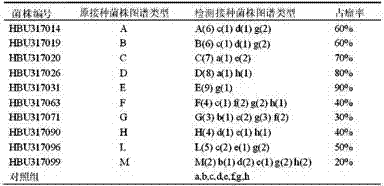A high-efficiency nitrogen-fixing Rhizobium meliloti strain and its molecular marker screening method
An alfalfa and rhizobia technology, applied in microorganism-based methods, biochemical equipment and methods, bacteria, etc., can solve the problems of inability to achieve high yield, low nitrogen fixation efficiency, mixed rhizobia strain types, etc., and achieve good affinity , planting yield increase, good adaptability effect
- Summary
- Abstract
- Description
- Claims
- Application Information
AI Technical Summary
Problems solved by technology
Method used
Image
Examples
Embodiment 1
[0025] (1) Sampling, separation and purification: For the alfalfa planted in the surrounding areas of Huanghua, Cangzhou, Hebei, we selected the plants with good growth and robustness, and the root nodules were sampled at the early flowering stage of alfalfa. At each sampling location, a 5-point sampling method was used. Sampling, the sampling area of each point is 1m 2 , select plump pink nodules for each plant, 3 large nodules, and two sites, each with 45 nodules, and a total of 90 nodules were obtained from the two sites;
[0026] To isolate and purify the selected nodules, the specific steps are as follows:
[0027] (a) Select the intact and unbroken nodules and put them into sterile water to fully soak them;
[0028] (b) Disinfection of the nodule surface: 95% ethanol for 3 minutes—0.5% hypochlorous acid for 3 minutes—sterile water for 6-8 times;
[0029] (c) Plate streaking separation: crush the sterilized nodules with a toothpick, pick the bacterial liquid in the no...
Embodiment 2
[0062] Example 2 Identification of strains
[0063] The preservation name of the strain provided by the present invention is Sinorhizobium meliloti 729-2-4, the preservation unit is CGMCC, the preservation number is CGMCC No. 9755, and the preservation date is October 10, 2014. The address of the preservation unit is No. 3, Yard 1, Beichen West Road, Chaoyang District, Beijing, Institute of Microbiology, Chinese Academy of Sciences.
[0064] The high-yielding alfalfa rhizobia strain provided by the present invention has an optimum growth temperature of 28° C., aerobic culture, and colonies on YMA medium are translucent, milky white, round, with thin edges, thick and thin middles, and grow. The time is 48-72 hours, and the colony size is 3-5mm; the bacterial cell is rod-shaped, with hydroxy fatty acid particles with strong refraction, accounting for 1 / 3 of the cell volume, slightly rounded at both ends, and 2-3μm × 3- 5 μm, Gram-negative bacteria, Gram stained red.
Embodiment 3
[0065] Example 3 Application of new strains
[0066]Experimental method: the strain obtained in Example 1 of the present invention is inoculated on alfalfa planted in the field (around Huanghua), and its inoculation method, inoculation area and sampling detection method are as shown in step 8 of Example 1; The experimental conditions were inoculated with the American strain (AM185H2) and the Australian strain (AU128) as a comparative experiment.
[0067] Experimental results:
[0068] Table 4 Application results of bacterial species
[0069]
[0070] Note: Tukey test is used, a b c are different subsets, the above data are sampled at five points in the experiment, and the average value of the indicators measured in three parallel experiments.
[0071] It can be seen from the table that the strains from Australia and the United States are not as good as the strains screened by the present invention in improving the yield of alfalfa. It can be seen that the screening metho...
PUM
 Login to View More
Login to View More Abstract
Description
Claims
Application Information
 Login to View More
Login to View More - R&D
- Intellectual Property
- Life Sciences
- Materials
- Tech Scout
- Unparalleled Data Quality
- Higher Quality Content
- 60% Fewer Hallucinations
Browse by: Latest US Patents, China's latest patents, Technical Efficacy Thesaurus, Application Domain, Technology Topic, Popular Technical Reports.
© 2025 PatSnap. All rights reserved.Legal|Privacy policy|Modern Slavery Act Transparency Statement|Sitemap|About US| Contact US: help@patsnap.com



